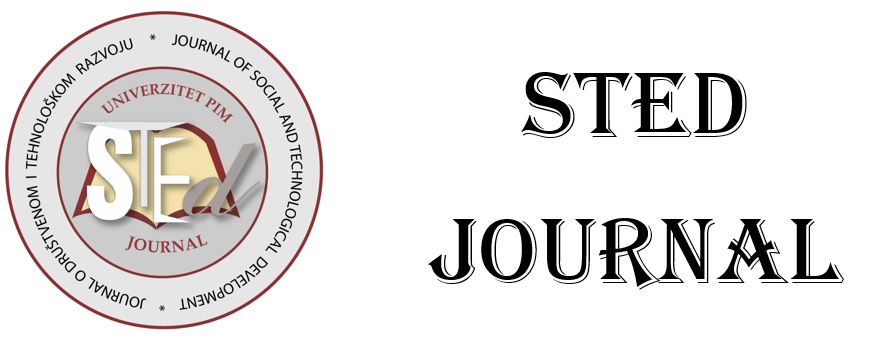
More articles from Volume 3, Issue 1, 2021
PORODIČNO AFEKTIVNO VEZIVANJE I AGRESIVNOST KOD NEPSIHOTIČNIH POČINILACA NASILNIH KRIVIČNIH DELA
AFEKTIVNA VEZANOST U DJETINJSTVU KAO PREDIKTOR STRESA, ANKSIOZNOSTI, DEPRESIVNOSTI I ADVERZIVNIH ISKUSTAVA KOD MLADIH
INTERPERSONAL RELATIONSHIP AS A FACTOR OF JOB SATISAFACTION
REGIONAL COOPERATION OF DEVELOPMENT IN LOCAL GOVERNMENT (CASE IN THE PROVINCE OF EAST JAVA, INDONESIA)
УПОТРЕБА ИНТЕРНЕТА У ПРЕДУЗЕЋИМА У РЕПУБЛИЦИ СРБИЈИ ЗА ВРЕМЕ ПАНДЕМИЈЕ COVID-19
Article views
INTERPERSONAL RELATIONSHIP AS A FACTOR OF JOB SATISAFACTION
Faculty of Economics, University of Banja Luka , Banja Luka , Bosnia and Herzegovina
Received: 15.04.2021.
Accepted: 15.05.2021. >>
Published: 28.05.2021.
Volume 3, Issue 1 (2021)
pp. 21-29;
Abstract
Job satisfaction is positive emotional state, which is result of evaluation of some work experience. It is a multidisciplinary phenomenon, which is influenced by multiple internal and external factors. In this paper, employee satisfaction or job satisfaction was observed as a dependent variable, while interpersonal relationships are defined as influencing factor, i.e. independent variable. Interpersonal relationships imply establishment of social relations and connections between individuals at work. Interpersonal relationships can be defined as the subjective experience of employee in interaction or connection with another person (colleagues or superiors). Factors such as gender, age, education, work experience and job position are included in the analysis as control variables. Main hypothesis in this paper states that positive interpersonal relationships have impact on employee satisfaction. The independent variable is divided into three segments, namely: communication and work climate, relationship with superiors and relationship with colleagues. Each segment of interpersonal relationships was separately tested in relation to the dependent variable. The base of this paper is an empirical research conducted in 2019. Based on the survey questionnaire, data from 143 employees in the surveyed company were collected. Data processing was performed on the basis of statistical software for social sciences-SPSS. Descriptive and correlation analysis were applied in the data analysis. All hypotheses tested were confirmed. Testing the hypotheses confirm that there is a statistically significant relationship between observed variables and that there is a moderate positive correlation, which implies that interpersonal relationship is a factor of job satisfaction. Main limitation of this research relates to the observation of relationship between variables in a single business entity. However, the coverage of all employees in the conducted research and the high response rate of employees (82%) provide a good basis for data analysis and giving some general conclusions. Detailed description of research methodology enables its repetition in other organizations.
Keywords
References
Citation
Copyright
All papers are licensed under a Creative Commons Attribution 4.0 International License.
Article metrics
The statements, opinions and data contained in the journal are solely those of the individual authors and contributors and not of the publisher and the editor(s). We stay neutral with regard to jurisdictional claims in published maps and institutional affiliations.











